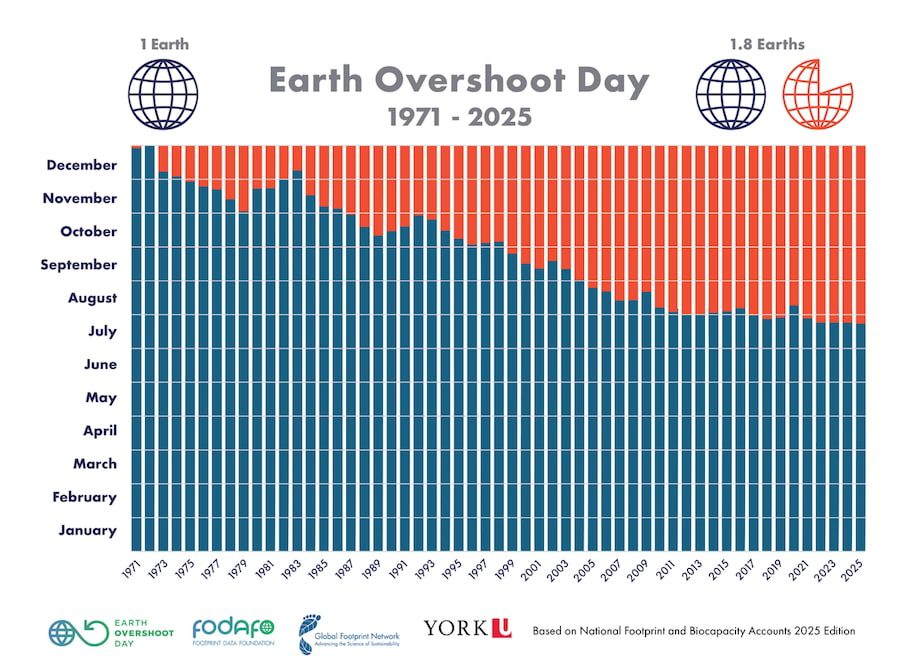Coal
mining
trucks
at
an
opencast
coal
mine
in
Kalimantan,
Indonesia
on
Dec.
8,
2024.
Afriadi
Hikmal
/
NurPhoto
via
Getty
Images
Why
you
can
trust
us
Founded
in
2005
as
an
Ohio-based
environmental
newspaper,
EcoWatch
is
a
digital
platform
dedicated
to
publishing
quality,
science-based
content
on
environmental
issues,
causes,
and
solutions.
Earth
Overshoot
Day
is
the
point
in
the
year
when
human
demand
for
materials
obtained
from
nature
exceeds
what
the
Earth
can
naturally
regenerate
in
one
year.
For
2025,
Earth
Overshoot
Day
fell
on
July
24,
the
earliest
it
has
been
since
the
event
was
first
calculated
in
2006.
The
Earth
Overshoot
Day
was
first
launched
in
2006
by
Andrew
Simms,
an
author,
political
economist
and
campaigner,
in
collaboration
with
Global
Footprint
Network,
as
reported
by
Sustainability
Magazine.
Since
then,
Earth
Overshoot
Day
is
calculated
and
announced
annually.
Since
2006,
the
date
has
come
earlier
and
earlier,
signaling
just
how
rapidly
human
consumption
habits
are
growing
and
stripping
the
planet
of
its
resources.

This
year,
Global
Footprint
Network
also
recalculated
previous
Earth
Overshoot
Days,
even
prior
to
2006,
for
greater
accuracy.
According
to
the
latest
calculations,
Earth
Overshoot
Day
fell
as
late
as
December
31
in
1972
but
crept
up
to
November
3
by
1979.
In
the
early
1980s,
the
date
went
back
into
early
December,
only
to
reach
October
12
by
1989.
The
date
stayed
in
October
from
1989
until
1999,
when
it
reached
September
25.
In
2006,
when
Earth
Overshoot
Day
was
first
announced,
the
latest
calculations
put
the
event
on
August
22.
The
date
reached
July
for
the
first
time
in
2018,
returned
back
to
August
briefly
in
2020,
and
has
remained
in
July
ever
since.
The
previous
earliest
record
was
July
25,
which
happened
in
2022
and
2023.
The
world
reaching
its
earliest-ever
Earth
Overshoot
Day
highlights
how
much
humanity
is
consuming
and
how
nature
cannot
continue
to
keep
up
with
such
high
demand.
Today
is
#EarthOvershootDay.
Falling
on
July
24th
means
that
humanity
is
currently
using
nature
1.8
times
faster
than
Earths
ecosystems
can
regenerate.
#OvershootDay[image
or
embed]—
Global
Footprint
Network
(@footprintnetwork.bsky.social)July
24,
2025
at
12:33
AM
We
are
currently
using
nature
1.8
times
faster
than
it
can
regenerate,
according
to
Global
Footprint
Network.
Consumption
of
freshwater,
trees,
and
seafood
are
all
examples
of
natural
items
that
cannot
replenish
as
quickly
as
they
are
depleted,
not
to
mention
that
humanity
is
emitting
far
more
carbon
than
ecosystems
can
absorb.
But
as
Global
Footprint
Network
pointed
out
in
this
year’s
Earth
Overshoot
Day
announcement,
depleting
resources
at
this
pace
has
a
cumulative
effect,
even
if
the
date
stays
steady.
With
consumption
outpacing
replenishment,
the
pressure
increases,
as
we
have
already
seen
with
humanity
nearly
exceeding
seven
of
nine
planetary
boundaries.
“We
are
stretching
the
limits
of
how
much
ecological
damage
we
can
get
away
with.
It
is
now
a
quarter
into
the
21st
century
and
we
owe
the
planet
at
least
22
years
of
ecological
regeneration,
even
if
we
stop
any
further
damage
now,”
Lewis
Akenji,
board
member
of
Global
Footprint
Network,
said
in
a
statement.
“If
we
still
want
to
call
this
planet
home,
this
level
of
overshoot
calls
for
a
scale
of
ambition
in
adaptation
and
mitigation
that
should
dwarf
any
previous
historical
investments
we
have
made,
for
the
sake
of
our
common
future.”
It
is
not
too
late
to
start
correcting
course
for
the
future.
According
to
Global
Footprint
Network,
moving
the
date
is
possible
through
several
different
actions
that
have
been
outlined
in
a
campaign
called
the
Power
of
Possibility.
One
of
the
biggest
improvements
would
be
by
cutting
carbon
emissions
50%
to
move
Earth
Overshoot
Date
farther
into
the
year
by
three
months.
Reducing
global
food
waste
by
half
would
push
the
date
13
days,
establishing
a
Green
New
Deal
at
global
scale
could
move
the
date
42
days,
and
generating
at
least
75%
of
electricity
from
renewables
could
push
the
date
by
26
days.
“Because
of
the
nature
of
physics,
overshoot
cannot
last.
It
will
end
either
by
deliberate
design
or
dumped-on
disaster,”
Mathis
Wackernagel,
co-founder
and
board
member
of
Global
Footprint
Network,
said
in
a
statement.
“It
should
not
be
too
hard
to
choose
which
one
is
preferable,
particularly
in
light
of
so
many
possible
choices.”
Subscribe
to
get
exclusive
updates
in
our
daily
newsletter!
By
signing
up,
you
agree
to
the
Terms
of
Use and Privacy
Policy,
and
to
receive
electronic
communications
from
EcoWatch
Media
Group,
which
may
include
marketing
promotions,
advertisements
and
sponsored
content.





